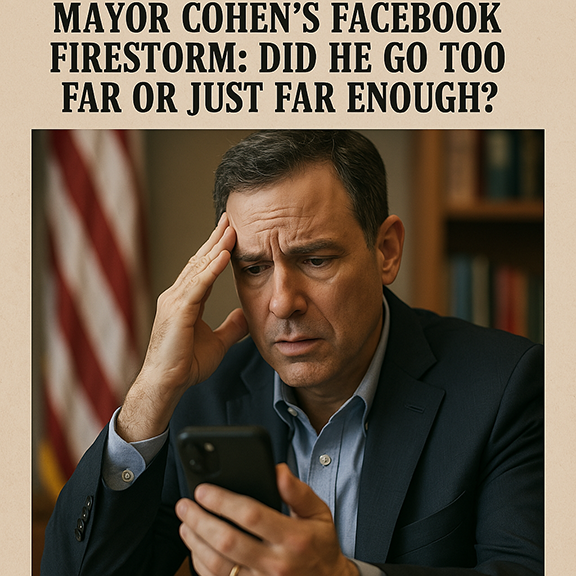Eyes On EB: A Tariff, a Tantrum, and a Trending Thread
Mayor Brad Cohen made waves this week—not for fixing potholes or announcing a new recycling initiative—but for wading knee-deep into the boiling national discourse on Trump’s new tariffs. If you haven’t been keeping up, the Mayor’s Facebook post sparked a virtual wildfire on the Mayor’s Page, with hundreds of comments, barbs, graphs, insults, and what can only be described as a performance piece between a few regulars whose fingers need a rest.
Let’s get to it.
Should the Mayor Have Gone There?
Yes… and maybe no.
On one hand, Brad Cohen’s a citizen, a voter, and a father. He’s allowed to have an opinion. And let’s be real: when someone with an MBA sees what they believe is economic sabotage playing out in real-time, staying silent might feel like complicity. Many appreciated his thoughtful take, and he did what most elected officials don’t—he engaged. Civilly. Repeatedly. While others were swinging personal insults like dodgeballs in middle school gym, Cohen held his ground without getting in the mud.
But then again, he’s the mayor. The mayor of East Brunswick, not the Federal Reserve Chair. And when the thread started spiraling into culture war territory—bathrooms, pronouns, children, and whether America is actually Brazil in disguise—it probably became clear this wasn’t a healthy civic dialogue. That’s where some argue he should have exited stage left, fast.
Still, I give him credit for staying in the arena while many others are busy anonymously trash-talking from the bleachers.
The Vibe in the Comments: A Country Divided, Even on Egg Prices
The conversation was… a mess. A democratic mess. Democracy at its best? Maybe. At its loudest? Definitely.
Some were clapping for Trump like he was headlining a Broadway revival of “Make America Great Again: The Musical.” Others were lobbing economic statistics, quoting Nobel Prize winners, or reminding the thread that yes, actually, empathy isn’t a radical leftist plot.
A recurring theme was fear—fear of decline, of change, of economic uncertainty, of bathrooms. It’s not just politics at play here, it’s identity, personal values, and in many cases, a deep exhaustion with being told what is or isn’t true. People don’t just disagree anymore; they don’t trust that the same set of facts even exists. And that’s the real story.
“Take Back Our Country” — A Phrase That Rings a Bell
This was the closing line in the mayor’s original post. It’s also the part that made my skin crawl a little—not because of who said it, but because of what it evokes.
“Take Back Our Country” has been used many times in American political rhetoric, especially when people feel like outsiders in their own homeland. Sometimes it’s empowering. But other times, it’s a dog whistle. Take it from 1960s segregationists to post-9/11 nationalists to Tea Party rallies to January 6, 2021. It’s a phrase that flirts with the edge of populism and exclusion, depending on who’s shouting it and what they mean by “our.”
If “take back” means restoring dignity, truth, and empathy to our democracy—great, sign me up. But if it means scapegoating the vulnerable or sowing division for power’s sake, then we’ve been here before. And history tells us it doesn’t end well.




